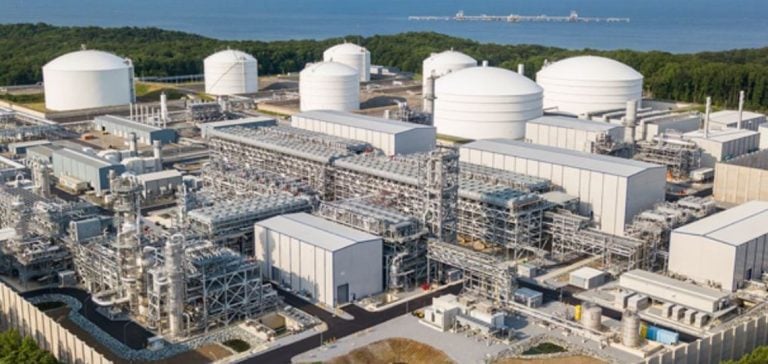The Cove Point LNG plant in Maryland is one of the main liquefied natural gas (LNG) export facilities in the United States. Operated by Berkshire Hathaway Energy, it shut down on September 20 for three weeks of annual maintenance.
This planned shutdown temporarily reduces the flow of natural gas to the plant to almost zero, compared with a daily average of around 0.7 billion cubic feet per day (bcfd) since August.
LNG plants frequently carry out these maintenance operations during periods of low global demand, either in spring or autumn, to minimize market disruption.
Cove Point is a key LNG export facility, with a liquefaction capacity of around 0.8 bcfd.
This volume is sufficient to supply around five million American homes every day.
Property management and share allocation
Berkshire Hathaway Energy owns 75% of Cove Point after completing its $3.3 billion acquisition of 50% of Dominion Energy in September 2023.
Brookfield Asset Management holds the remaining 25%.
This acquisition strengthens Berkshire Hathaway’s position in the LNG sector, by securing majority control of the plant.
Originally built as a natural gas import facility, the site has adapted to changes in the global market, becoming a key export infrastructure for the United States.
The expansion of liquefied gas exports to Asian and European markets has made it a key player in international energy trade.
Temporary impact on gas flows
Since the start of the shutdown, natural gas flows have fallen drastically, from an average of 0.7 bcfd to close to zero.
This drop is temporary and should not significantly affect the global LNG market, as these turnarounds are scheduled during periods of historically lower demand.
Exports will resume once the work is completed, which is scheduled for mid-October.
Market players are keeping a close eye on this type of shutdown, however, as prolonged outages or delays in maintenance could lead to market tensions, particularly in Europe and Asia, where imports of US LNG have become increasingly important in recent years.
Long-term contracts and international customers
Exports from Cove Point are governed by long-term contracts.
Most of the LNG produced on this site is sold under 20-year contracts to international customers.
Major buyers include GAIL (India) and ST Cove Point, a joint venture between units of the Japanese Sumitomo Group and Tokyo Gas.
These contracts guarantee revenue stability for site operators, while securing a steady supply for customers in regions where natural gas plays a key role in power generation.
Cove Point continues to meet growing demand in Asia, a region where energy needs are steadily increasing, particularly in Japan and India.
These markets are increasingly relying on LNG imports to meet their domestic consumption, particularly in the context of decarbonization efforts and the gradual reduction of dependence on coal.
A global market under pressure
The shutdown of Cove Point comes against a backdrop of sharp fluctuations in natural gas prices worldwide.
Geopolitical tensions, notably the war in Ukraine, have disrupted supply chains and prompted many European countries to turn to alternative suppliers, notably the United States, to replace Russian gas.
This development reinforces the strategic importance of American infrastructures such as Cove Point in securing energy supplies.
Although the plant will resume operations in a few weeks’ time, its shutdown is a reminder that LNG exporters such as the USA now play a central role in the global energy balance.
Cove Point’s return to full service is eagerly awaited as Europe prepares for winter, a period traditionally marked by a surge in demand for natural gas.
Berkshire Hathaway Energy’s role in the operation of Cove Point and in the LNG business is strengthening, with solid long-term growth prospects, thanks in particular to growing demand in Asia and Europe.






















